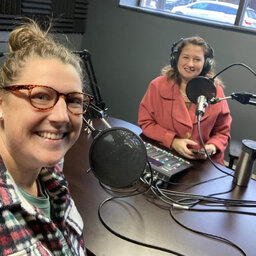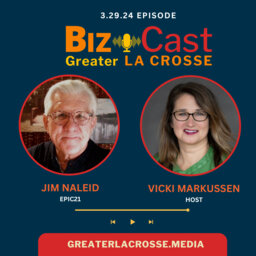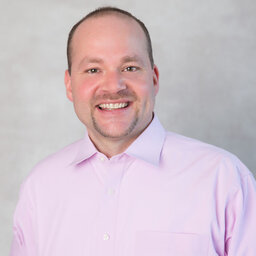
Episode 06
Growing a Startup with Emily Boland – Hunt & Gather Grazing Boards
About BizCast Greater La Crosse
We bring you news from the business community. From startups to experienced problem solvers, you’ll get in-depth insight on the challenges and opportunities of doing business in Greater La Crosse. Our show is a collaboration between WIZMNews.com and BizNews Greater La Crosse ( GreaterLaCrosse.media ).
Transcript
Emily Boland 0:00
Suddenly, every day during the holiday season, I think I cannot believe that people are willing to pay me to do this because this is the coolest freakin job ever.
Vicki Markussen 0:11
Welcome to BizCast Greater La Crosse – news from the business community. I’m your host, Vicki Markussen, and joining me is Emily Boland. She is the owner of Hunt & Gather Grazing Boards. I was catching up with your Facebook profile. So, you and I – just so everybody knows – you and I started talking pretty soon after you started up, probably about six months in. I just looked at your Facebook. You have 42000 followers. You’re moving and shaking. We’ll get into that. Things have really started to move for you. So, you started in February 2021, middle of the pandemic. Just so everyone knows, a pandemic was just the growth of so many people starting up their own businesses, and you were one of them. Why did you start up?
Emily Boland 0:57
I think we were all just really sick of just sitting. That’s where I was at to. My husband is a nurse, so he had worked through that whole pandemic. We had decided to virtual homeschool our daughters for that, that full first school year after the pandemic started and nearing the end of it. During that February timeframe, I was just getting so overwhelmed just by the concept of everything that was going on worldwide on top of like what was happening inside our house, that I kind of just started coping with cheese and wine. My loving husband was like, “Hey, honey, maybe we could do this with friends.” So we did. I put a post out on like around Valentine’s Day asking if some people would want a grazing board because I was just playing around with it with for my kids and my husband and whatnot. So, I asked them if they want one. We got a good, I think, we had like two orders that weekend. To me, that was just like amazing. Holy crap, I get to make these boards for other people!
Vicki Markussen 1:57
And nibble on cheese and then process!
Emily Boland 1:59
Right exactly. Like there’s no better way to do it. Then 10 days later, we had an LLC. The following day, we were in a commercial kitchen. I don’t necessarily know that we went all the steps in the right order. But I think that’s part of the learning process of owning a business. Right?
Vicki Markussen 2:15
Absolutely. It has grown from two to what is what do your orders look like now?
Emily Boland 2:21
SSo,the weekend before Thanksgiving into the Wednesday before Thanksgiving we did almost 400 boards.
Vicki Markussen 2:27
And is that just you doing this?
Emily Boland 2:29
No, no, we have some help. We have some part-time staff that help us with cutting cheese and prepping things. My husband will come in and help. So, we have a kitchen that we go to, and we work out of it. It gets a little full in there on those weekends, for sure. There’s just tabletops full of boards and orders. But it’s awesome.
Vicki Markussen 2:50
You and I were joking before this too because I was saying okay, how do you say it? Do you say it charcuterie?
Emily Boland 2:58
That is why we call them grazing board.
Vicki Markussen 3:01
And now if you can spell it, that’s the next thing, right?
Emily Boland 3:03
That is the $10,000 question, for sure.
Vicki Markussen 3:06
And it has expanded. I saw on your Facebook page you had a presence at Frostbite this past weekend. Where have you gone that you weren’t expecting to go?
Emily Boland 3:16
We have done big jobs – like other businesses ordering our boards, that was huge. For me, I was like, hey, there’s other business owners that want to buy into what we’re doing, that’s incredible.
Emily Boland 3:26
The space and realm that I knew I wanted to be in, that we never imagined we would be in, is this kind of giving back realm. So, it started with just like making small donations when we could, to like being able to sponsor families over Christmas. Then just last weekend, actually, we were able to donate an entire tabletop setup to the Good Fight Community Center. You know, you have to make more to give more, so I never imagined that many people would be buying into this dream of mine so that we could then in turn do that.
Vicki Markussen 3:53
When we started messaging back and forth. You and I had talked about marketing. You said, oh my gosh, I have to factor that into the cost of my product. What was also interesting was how much the University had embraced you. Is that still a big portion of your business?
Emily Boland 4:09
I don’t know how we got shared with the university in the area, Viterbo and Western and UW-L, but somehow our product was shared with some parents. That has been a huge part of our business. They order the boards, and then we deliver them to their students. Whatever size they find on the website. And yeah, it’s just a huge, huge part of our business. I think it’s a chance for parents to get to connect with their students in such a special way. So, we’re able to add little notes to it, or we do those number orders for birthdays. So like you know 19,20, 21. Those are, those are big birthday orders, especially at the University or just a small gift of, “Hey, I’m thinking about you.”
Emily Boland 4:11
Why wouldn’t parents want something that’s locally owned and somewhat healthy, in moderation?
Emily Boland 5:00
The cool part too for us is that parents will message us and ask or put in their orders and ask us like, “Hey, do you have any other recommendations?” We can make the recommendations to other small, locally owned businesses. You know, floral markets for bouquets, or bakers for cupcakes. We’re able to make these recommendations and kind of just continue diversifying those small businesses and giving them more exposure.
Vicki Markussen 5:24
I’m guessing that for most of us, it’s like the holidays are coming. We have all these families coming into our house, how do we make it easier, so you make it easier for the rest of us, but what are the holidays like for your business,
Emily Boland 5:39
The holidays are a little bit insane. This is where I understand the market that I’ve reached and the business that I own because I know as long as like I don’t have to put the effort into bringing it to my own party, then I’m all for it. I think that that exact same experience is what our customers are having too, and it gets very … just wild. I constantly, every day, during the holiday season, I think I cannot believe that people are willing to pay me to do this because this is the coolest freakin job ever. It’s just constant gratitude for the fact that people will support us in that way. That’s so cool.
Vicki Markussen 6:19
That’s what they say. Right? You know that you’re doing what you should be doing when you don’t see it as work – when it’s just all passion.
Emily Boland 6:27
Yeah. I think there are definitely days where it’s work where it’s like, “Gosh, we have 100 boards to make today.” That’s overwhelming. But as long as we have our scheduling right and our timeframes right, it never feels like work.
Vicki Markussen 6:40
If you could redo your path, what would you change?
Emily Boland 6:44
I think I would ask for help sooner. I think that I would set some personal boundaries like setting some time aside a little sooner. I think I would also do time management a little bit better. That is definitely a place that is struggling. We joke that we make a calendar weekly now, which is something we hadn’t done before. I call it my emotional support calendar. It comes everywhere with me. Sometimes it’s just there so that I can be like, “Okay, I am on track.” And so, I think that I would go back, but the hard part is like you can’t go back and become the person you are now. And of course, there’s gonna be a future version of me that I’m like, “Gosh, you know, I’m really proud I became her too. “So, I think that all the trials and tribulations are there just to kind of mold us into the business owners that we are, where we need to be when we need to be them. I haven’t really hit a huge snag where I feel completely at a loss of what to do. This business has given me a ton of confidence to be able to kind of pivot and be kind of a problem solver, not hit the barrier, and think I should quit – which is not a personality trait I had before. I was very much like, “Oh, this is small and inconvenient to have, and I should probably just stop.” I think that’s something that I take a lot of pride in, is that we’ve had this ability, my husband and I, to kind of encourage each other. I still remember the first time I really knew he believed in the business because he went and did one of our pickups for us. He gets a lot of the things that we need. Then we put in the orders, and he had spent like $400 more than I had budgeted for. I had a complete meltdown, like not small, it was not cute. And I was like, “Why did you spend all that money? That’s gonna come out of our personal bank account. Because we are zero debt business, which means we pulled out of our savings, and we have just reinvested profits. So at that point, I was like, we don’t have enough profit to be reinvesting like this. This is coming out of our savings account. He’s like, “Honey, it’ll be fine. I believe in you. I know that we’ll be able to sell like these extra eight packs of olives. You’ve got it.” I will always kind of look at that moment as a huge turning point. In the business of like, it wasn’t just me. It was our family. It was our family’s income buying into it. It was our family’s savings account, buying into it. So, this was just much more belief in me than anyone, myself included, had. I knew that I just couldn’t quit at that point.
Vicki Markussen 9:17
That’s amazing. It’s nice that I talked to you in the beginning stages because now I can say, wow, look at how far she’s come. I remember you saying that your husband was pretty doubtful, like, “Oh my gosh, you can’t charge that for meat and cheese!” Then he saw it sell. So then you get to this point of now he’s pushing you, like go a little bit farther. What has food prices done for you?
Emily Boland 9:43
Oh, gosh! Food prices have increased for everyone! We are no different. Businesses are still incurring that same cost. But I think the problem that businesses specifically have is that we’re the last ones to catch up to the food price increase. Not only do we have to incur the cost of goods increase, which means our profit margin drops, we then, in order to be able to make up that, have to increase our prices. Immediately we see the customer suffering. We don’t want to do that. We don’t want to make the customer at more of a disadvantage than they’re already at by increasing our prices. We see these businesses six months behind huge cost of goods increases. We’re like, what are they doing? Why are they increasing now? It’s because they didn’t want to make you pay for it, but now they absolutely have to. I think that’s where we struggle the most is the food prices just keep going up. Trying to stay inline with those, but also keeping the customer in mind and realizing that they’re the most important part of our business. It’s really a kind of tough balance.
Vicki Markussen 10:47
As a small business, you are probably most sensitive to price increases because the other businesses just have quantity to make up for it. It would be interesting to say, “Okay, I’m seeing changes here and here. Now it’s time for us to do it. But it also impacts is, as you’ve said, some of those passion areas, like the ability to donate if you don’t have the same profits coming in. It’s that much harder.
Emily Boland 11:09
There’s simple things like a box of crackers that we were getting two years ago. When we first started it was $1.65. It’s now $2.19, which isn’t like it’s not a huge deal. Well, it’s not even 60 cents difference. But when you’re buying huge cases of them, that’s $10-$15 difference per case. And that’s just one item, That’s not taking into account cost of meat increases, cost of cheese increases.
Emily Boland 11:09
I guess that leads into what’s next? What’s your vision for where you’re going?
Emily Boland 11:13
Right now, we’re out of the Capella Performing Arts Center, which is on 721 King Street, our hope is to stay there. But ideally, we’d love to open up a retail space. We’ve gotten a lot of feedback, especially at Frostbite this past weekend, about people wanting to see the cheeses that we use in retail, which is not a realm that I had ever imagined we would be. I kind of thought that people enjoyed us making the boards. I’m realizing now, us being able to curate and work with all these regional artisans, especially here in Wisconsin. We have so many amazing cheeses to offer. We’re able to feature all those incredible local cheeses on our boards. Now people are wanting to buy them in larger quantities. And I’m like, wow, that wasn’t something I thought about. I think that is absolutely something we can embrace.
Vicki Markussen 12:20
That’s the ripple effect. So your business is now fueling other businesses and small local businesses probably as well.
Emily Boland 12:28
So yeah, that’s exciting. It is, it’s really cool. It’s fun to to be a part of it. The business realm is something – my background is in disability advocacy. I went to UW-L and got a degree in therapeutic recreation, and then worked in disability advocacy for a little while after that. So business is a completely new round to me. That being said, the business community, especially in La Crosse, in the Coulee Region, is incredible and uplifting and supportive. I absolutely love being a part of, encapsulated by, this very specific group of people. It’s so collaborative that it’s – I’m not gonna say it’s impossible to fail – but it is, if you are willing to reach out ask for help ask for mentorship. There are people willing to help to step in. I think that that is incredible. Not every community and area is like that. So, we’re really grateful and have this really special perspective in this area to be able to do that.
Vicki Markussen 13:27
That’s amazing to hear. I mean, that’s what we need to fuel more small businesses because that is where, in terms of quantity of growth, that’s where small businesses is where it’s at.
Vicki Markussen 13:38
So, I always like to end the show with what makes you passionate about what you do. Why are you passionate about it?
Emily Boland 13:46
I think I’m super passionate about it because food to me and to our family has always kind of been this space of gathering, exploring and trying. And through the business, we’re able to offer that to other people. We’re able to kind of offload those things that stress them out about – what to bring to family gatherings or what to bring to small gatherings. We can offload that workload and kind of ease their life there. Then we can give them an opportunity in a talking space like, “Hey, did you try that cheese?” or “Did you try that meat, that cracker?” All of these opportunities to kind of connect and gather over food! A big part of the business for me has always been helping you gather with confidence – like we just want you to feel confident when you walk into that gathering. There’s already enough stressors in the world. Let us do the meat and cheese.
Vicki Markussen 14:32
You’re listening to BizCast Greater La Crosse with my guest Emily Boland with Hunt & Gather Grazing Boards. Thanks for joining us.
Emily Boland 14:39
Thanks so much, Vicki.




